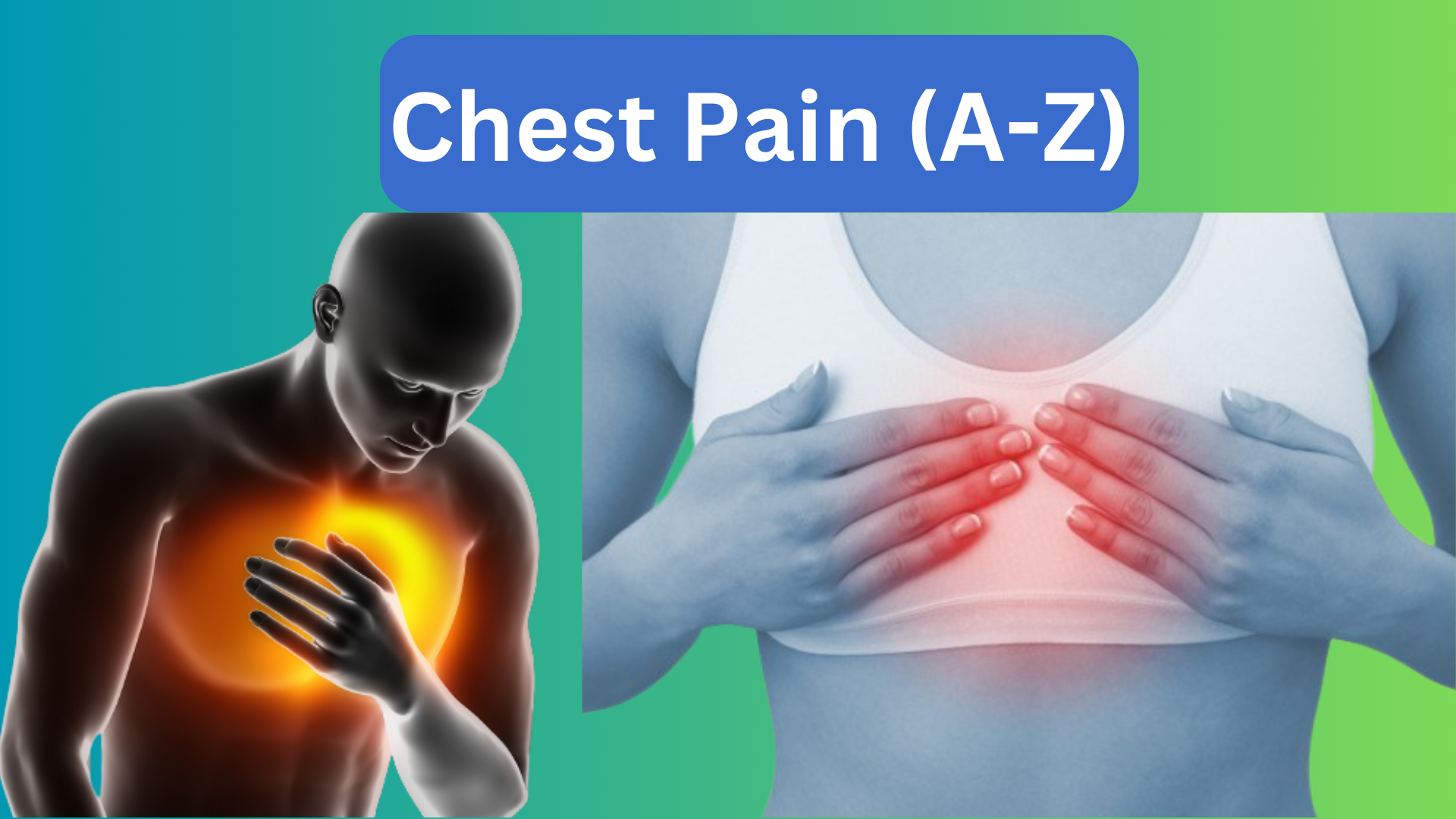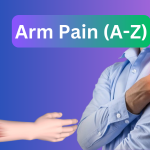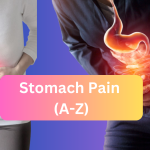Chest Pain (Pleurisy): Causes, Symptoms & Best Treatment Options. Click to learn right side chest pain, tightness in chest, left/right side chest pain, pain in middle of chest, pleurisy treatment, anxiety chest pain.
A very common disease is chest pain. Although some people with chest problems describe their pain as tightness, pressure, gas, burning, or aching, pain can be either sharp or dull.
Occasionally, people may also have pain in their arms, upper abdomen, neck, jaw, or back. Depending on the origin of the chest pain, additional symptoms could also be present, such as nausea, a cough, or trouble breathing.
Many people get analyses for even minor symptoms of chest pain because they are well aware that it might be a sign of potentially fatal diseases. Other people reduce or disregard its warnings, including many with serious illnesses.
What Is Chest Pain?
Any type of pain noticed in your upper body, from your jaw to the bottom of your ribs, is called to as chest pain.
There are five typical causes of chest pain.
A general uneasy feeling that makes you aware that something is amiss may also occur, as well as feelings of burning, pressure, crushing, or fullness. Chest pain can have many different reasons, and when it does, it’s usually crucial to seek quick medical attention.
Though other bodily systems can also produce symptoms of chest pain that you should be aware of, heart problems are one of the conditions that can cause it.
1.) Causes of Heart Disease
Chest pain is frequently caused by heart problems. The most prevalent type of heart disease in the US is coronary artery disease, which reduces blood flow to the heart. You may feel angina, which is a severe, stabbing sensation when this occurs.
These sensations may originate in your chest and then travel to your arms or back. People may link chest pain with heart attacks more than any other medical issue.
Blood flow to your heart during a heart attack may be completely blocked. Your chest may feel as though it is being squeezed or crushed. If you experience this kind of chest pain, dial 911 right away.
2.) Causes Related to Lungs
It’s likely that you will experience chest pain along with lung pain. Pleurisy is one typical cause. A thin membrane that covers your lungs might swell and become irritated.
Coughing or heavy breathing may make your chest hurt and feel sensitive when pleurisy inflammation is present. Some lung-related pains can necessitate emergency medical care, just like your heart pains.
One of these causes is pulmonary embolism. When a blood clot develops in one of the arteries in your lungs, this disease occurs. These include chest pains that are burning, aching, or sharp, as well as shortness of breath.
3.) Factors Related to Stress
You could experience intense fear, worry, and restlessness when you’re stressed out or anxious. Your chest may feel constricted, making it challenging to breathe as a result of these feelings.
A panic episode, which is a period of intense worry or terror, can be brought on by extremely high anxiety. Chest pain can result from heart palpitations, breathing difficulties, and a suffocating sensation during a panic attack.
4.) Causes Related to Digestion
Your liver, stomach, pancreas, and intestines are all part of your digestive system. These abdominal organs might cause chest pain even though they are in charge of processing the food you ingest.
One of the most typical digestive-related causes of chest pain is heartburn. However, it has nothing to do with your heart. Instead, it occurs when stomach acid rises and enters the esophagus. The upper area of your chest and neck will burn when the acid comes into touch with the esophageal tissue.
Chest pain might also be caused by other intestinal issues. The organ in your body that makes the digestive enzymes that break down the food you eat is called the pancreas.
5.) Causes Related to Muscle
If you’ve ever worked out at the gym and lifted weights, you may be familiar with how sore muscles feel (Muscle Pain). Your chest muscles may experience soreness if they become irritated, torn, or subjected to stress.
Chest pain resulting from muscle stress can be brought on by anything, including excessive coughing or improperly lifting anything heavy. When you make movements that require your chest muscles to contract, it might feel sharp or get worse.
Symptoms of Chest Pain
Along with the chest pain, you could have other symptoms. Your physician can make a diagnosis with the help of any symptoms you may be experiencing. These consist of:
Heart-Related Symptoms
Even though chest pain is the most typical symptom of a heart condition, some people also experience other symptoms. Particularly women may experience unusual symptoms that are subsequently determined to be caused by a cardiac condition:
- Chest stiffness or pressure
- Arm, back, or jaw pain
- Fatigue
- Lightheadedness
- Dizziness
- Dyspnea, shortness of breath
- Abdomen ache
- Nausea
- Pain during working out
Other Symptoms
Symptoms that may indicate your chest pain isn’t heart-related include:
- A bitter or acidic aftertaste
- Ache that only manifests after swallowing or eating
- Having trouble swallowing
- Depending on your body position, pain can go better or worse.
- Pain that gets worse when you cough or breathe deeply
- Rash and pain together
- Fever
- Aches
- Chills
- Clogged nose
- Cough
- Anxiety or panicky feelings
- Hyperventilating
- Back discomfort that spreads to the front of the chest
How Is Chest Pain Treated?
The best course of action for chest pain depends on what’s causing it. As soon as you call for assistance, you’ll receive emergency care if a heart attack is the source of your chest pain. A procedure or surgery to reestablish blood flow to your heart may be part of this.
Your doctor will discuss treatment options with you if a no-cardiac issue is the source of your chest pain.
Depending on your condition and how severe it is, they might advise:
- Modifications in way of life.
- Medicines. Surgery.
How Can Chest Pains Be Prevented?
Maintaining a healthy lifestyle can lower your chance of vascular, cardiac, and other disorders. This comprises:
- A balanced diet, You can construct an eating strategy that is suitable for you with the assistance of your healthcare professional or trained dietitian.
- Taking care of existing medical issues like diabetes, high cholesterol, and high blood pressure.
- Exercising on a daily basis.
- Getting to a healthy weight and keeping it there.
- Limiting your alcohol consumption.
- Not consuming tobacco.
Q. Is a person experiencing chest pain having a heart attack?
ANS. Digestive tract problems like gastroesophageal reflux disease or GERD, are classified as non-cardiac, or not connected to the heart, in the majority of cases of chest pain.
In addition to problems with the chest wall or other areas of the chest, problems with the organs located within the chest cavity can also cause chest pain. Chest pain can also be brought on by issues with nearby organs like the stomach. Anxiety may also be to blame.
Q. What is angina?
ANS. Angina is frequently described as causing a tightness, pressure, or squeezing sensation in the chest area of the body.
Additionally, the discomfort or pain may spread to the shoulders, arms, back, neck, and even the jaw. In women, nausea, vomiting, shortness of breath, stomach pain, etc. May also be present in addition to chest pain.
Angina is a symptom of underlying cardiac disease even though it is not a disease in and of itself.
Q. How can one differentiate between chest pain and Angina?
ANS. The term “chest pain” is used generally to refer to pain in the chest area that can occur for a variety of reasons. Angina, on the other hand, is a particular type of chest pain brought on by heart-related issues.
Q. What is stable angina?
ANS. When your heart has to work harder because of effort or psychological or emotional stress, stable angina develops. Because your heart no longer requires as much oxygen, the pain usually goes away when you rest.
Q. What other conditions might cause chest pain?
ANS. Any number of medical issues, including gastrointestinal problems including gallbladder disease, peptic ulcers, esophageal muscular spasms, or acid reflux, can result in chest pain.
It might also be an indication of another severe heart or lung condition, including a tear in the aorta or a blood clot in the lung.




1 Comment
Hey, everyone! Allow me to introduce myself as Admin Read:
Mega sb com – теневая, торговая площадка с гарантированным качеством продукции. На Мега Онион вы найдете товары и препараты, которые просто так не купить в магазах или аптеках. Сайт mega sb работает на территории России и за ее пределами, сотрудники магазина всегда готовы оказать квалифицированную поддержку и ответить на ваши вопросы. Зайти на сайт можно двумя способами, через сети ТОР использовав домен в зоне onion, или через обычный браузер, использовав доменом в зоне com. Оцените все преимущества онлайн-шопинга в удобном и безопасном формате с мега!”
мега даркнет:https://xn--mea-sb-j6a.com
Больше информации о Мега
Как зайти на Mega
Заработок с МЕГА
Как оплачивать безопасно на Mega Darknet